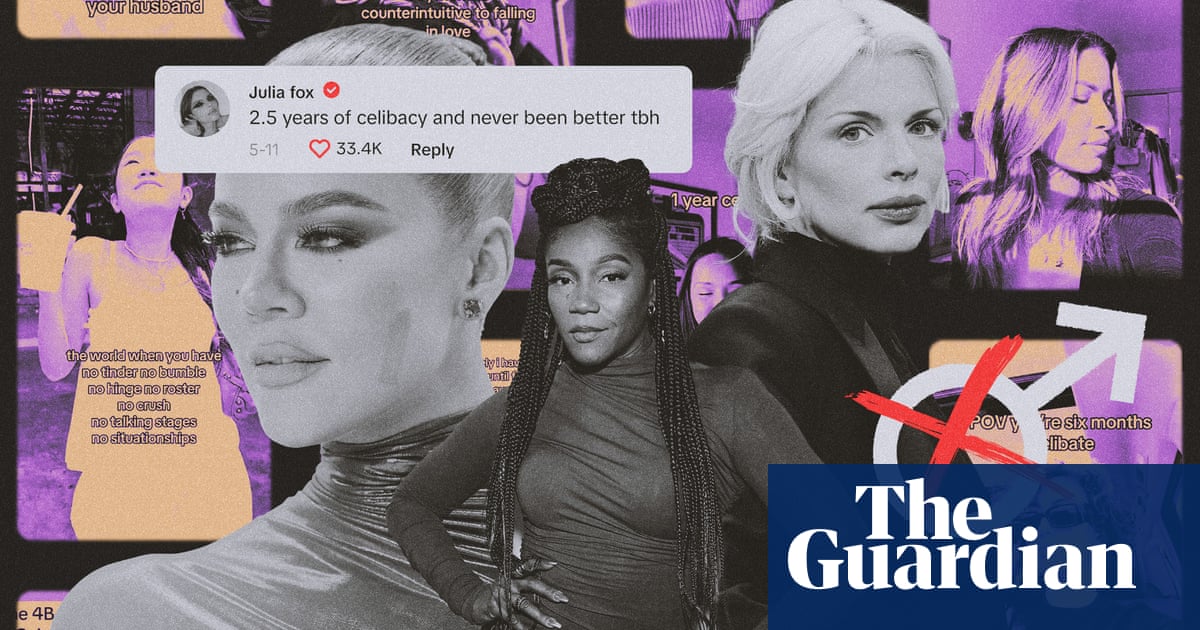Some call it “boysober”. Others take inspiration from South Korea’s 4B movement. And many just get right to it: they’re celibate.
For Olivia Iverson, a 28-year-old Minneapolis woman, it’s a little more complicated. For the past two years, she hasn’t dated much. She’s not opposed to finding someone, but she’s sworn off the apps and prioritized her existing friendships. “I’m re-centering my values around basically everything other than dating men,” Iverson, who works in marketing, said.
She’s not the only one. This year, women opened up about their decision to abstain from (usually straight) sex or dating. Whereas celibacy used to be associated with purity culture, promise rings and evangelical youth, this tool of the patriarchy has been reappropriated. Now, a woman might enter her “celibacy era” due to slim romantic pickings, or as a protest against misogyny.
A marked interest in celibacy first emerged post-Covid lockdowns, when some women who had stopped dating decided they didn’t need to rush back on to the scene once it was safer to do so. Some said the break had made them feel more confident in their sexuality. Others identified as “celibate sluts”, saying they didn’t need a partner to feel pleasure or enjoy desire.
Then, in early 2024, the term “boysober” went viral on TikTok, coined by the Brooklyn comedian and content creator Hope Woodward. It wasn’t a religious or prudish thing – Woodward told the New York Times she is sex-positive, even wearing an “I heart female orgasms” button at times. Mainly, Woodward and some of her 446,000 TikTok followers aim to distance themselves from the toxic elements of hookup culture, such as ghosting or staying in stagnant situationships.
Boysober ushered in a wider backlash against the indignities of dating culture and the ubiquity of dating apps such as Tinder, Hinge and Bumble (the only form of meeting people many in gen Z are familiar with). What should have been a feast of options had evolved into a slog, with some women growing so tired of the mechanics of online dating that they swore it off altogether. Dating horror stories went viral on social media, where women swapped anecdotes about sex-obsessed, commitment-phobic men and fears of ending up alone. One New York Magazine headline asked: “Is dating a total nightmare for you right now?”
In May, Bumble – created in 2014 as a feminist version of Tinder, its shtick being that only women could send the first message – launched an ad campaign deriding celibacy. “You know full well a vow of celibacy is not the answer,” read one billboard ad that quickly went viral, with some on social media accusing the company of shaming women who refused to take part in what they saw as the futility of swiping.
Bumble quickly issued an apology for its messaging, but the fiasco nevertheless inspired a deluge of celebrities to willingly flaunt their dry seasons. Khloé Kardashian said she just couldn’t fit dating into her schedule: “That’s my time. I’m not sharing it with a man. I’m not sharing my TV, I’m not sharing my bed!” Julia Fox concurred, commenting under a post about the so-called “Bumble fumble” that she’d been celibate for two and a half years, “and never been better”.
Kate Hudson took a more nuanced approach while appearing on the Call Her Daddy podcast in May, saying she had sworn off dating for a year in her 30s, on her therapist’s advice. She called the experience “very uncomfortable” but also “strangely empowering”.
Tiffany Haddish revealed that she also had decided to abstain from sex and drinking after a 2023 arrest for driving under the influence. “When you lay down with somebody, you are sharing your soul,” she said on a podcast hosted by the life coach Jay Shetty. “You are sharing a piece of yourself, you’re giving a little piece of yourself up. I think I only got so much soul left, and I don’t want to necessarily just give it over to anybody.”
Celibacy-chat reached its peak in the days following the election, when interest in South Korea’s 4B movement surged. 4B began after spycam videos of women undressing in hotels or public restrooms were shared widely online by men. In protest, South Korean women swore off four “no’s”: heterosexual marriage, dating, sex and childbirth. Women in the US suggested that it could be replicated as a response to Donald Trump’s win.
Early exit polls made clear that women aged 18-29 overwhelmingly voted for Kamala Harris, while Trump picked up support from their male counterparts. Many women couldn’t stomach the thought of having sex with a man who might have voted against their reproductive rights or in support of Project 2025’s regressive view of gender roles. Google searches for “4B” increased 450% on 6 November, as women took to social media to encourage others to cut off contact with men.
As one creator wrote on TikTok in a video viewed 4m times: “You lost your rights, and they lost the right to hit raw! 4B movement starts now!”
Haein Shim, a South Korean activist and undergraduate researcher at Stanford University’s Clayman Institute for Gender Research, called 4B “a new lifestyle focused on building safe communities, both online and in person, and valuing our existence in this crazy world”.
“What we want is not to be labeled simply as some man’s wife or girlfriend, but to have the independence to be free from the societal expectations that often limit women’s potential to be fully acknowledged as human beings,” she told the Guardian in November.
The celibacy movement has not gone unnoticed by men. Some manosphere figures latched on to 4B as an example of what they considered female hysteria. Nick Fuentes, a Trump-supporting white nationalist, tweeted: “Your body my choice. Forever.”
Dr Eric FitzMedrud, a psychologist based in Los Altos, California, who specializes in relationship and sexual issues, said his male clients had brought up the 4B movement during sessions.
“Men who struggle to connect with women are trying to make sense of the dating environment,” he said. “I think it’s really important for them to understand that 4B is not an attack on them; no man is going to be physically harmed or lose any rights due to it, and I encourage [clients] to instead question why women who might otherwise want to be in a sexual relationship come to such a desperate place to give up that aspect of their own desire. [I ask them if they can] develop a degree of empathy instead of continuing to see it defensively.”
As women wait to see how a second Trump administration might affect their lives, many are in no rush to jump back into the dating pool.
For Iverson, the Minneapolis woman, a series of “exhausting” and “unsavory experiences” with men made her realize she didn’t have to continue seeing them if she didn’t want to. “I’m investing the time that I would spend on men into my friends,” she said. “I’m not having any friendship breakups any more. Over the long term, that feels really beneficial and rewarding.”
She’s also reading more: “This time last year, I maybe read a few self-help books. Now, my No 1 hobby is reading.” Perhaps ironically, Iverson’s favorite genre is romantic fantasy novels. “Does that fill a void for me? Maybe,” she said. “It’s also a hobby, and I’ve joined a book club, so again, it’s something I do with my friends.”
Iverson still longs for a romantic connection, but her time away from men has also helped her learn what she wants from an eventual relationship and what her non-negotiables are. “Unfortunately, the ripple effect of my self-discovery is that weeds out a lot of people. But I like where I’m at right now,” she said.







